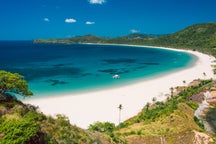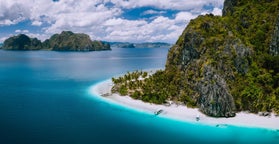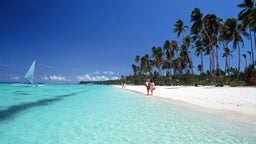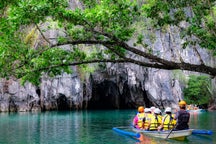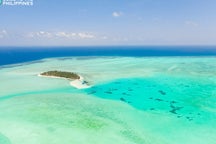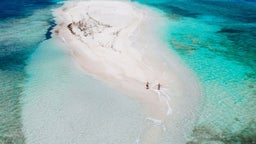Pagudpud is a northern coastal town located in the Ilocos Norte region of the Philippines. It is located 77 KM north of Laoag City in Ilocos Norte. It's a must-visit destination in Northern Luzon and is usually part of the Ilocos itinerary as a side trip when in Laoag. It is often referred to as the “Boracay of the North” mainly because of its stunning white Pagudpud Ilocos beaches, which is what Pagudpud is known for.
One of the beautiful small towns in the Philippines, Pagudpud is not packed with fancy shops, bars, and clubs. However, it offers visitors wonderful natural attractions like coves, caves, and rock formations and is an emerging top tourist destination in the Philippines and a must-visit Luzon tourist spot. You may not party the night away in Pagudpud like Boracay, but you can enjoy the outdoors and the beauty of nature.
From July to September, Pagudpud becomes a surfing hotspot for enthusiasts. The town is one of the less crowded Philippine surfing spots in northern Luzon. Pagudpud is also the main jumping point to the most famous windmills in the Philippines, the Bangui Windmills.
Even without elaborate tourist facilities, Pagudpud offers plenty of things to do and places to see.
To get started, here is a list of the top 12 attractions that you should add to your Pagudpud tours. This list will help you create the best Ilocos itinerary on what to do in your Ilocos tour package and have a more worthwhile Pagudpud travel experience.
12. Paraiso ni Anton
Paraiso ni Anton (Anton’s Paradise) is one of the most mysterious places in Pagudpud, Ilocos Norte tour packages. The site consists of a small waterfall with a Virgin Mary grotto (small shrine) beside it. Tall trees and thick vegetation stand as the background to the shrine. The white stairs leading up to the grotto provide easy access to visitors.
According to local stories, the site is named after a faith healer named Anton. This healer used to go to the site and use the water from the stream to heal people’s illnesses.
No one knows where Anton is or if he ever existed. However, most locals still believe in the healing power of the spring water. They also have high respect for the sanctity of the shrine.
Because of its religious nature and mysterious history, Paraiso ni Anton has become a popular attraction in Pagudpud.
After visiting the grotto, you can buy drinks and snacks from the stores in front of the parking area.
Paraiso ni Anton is about 2.1 kilometers from the Patapat Viaduct. The access point to the side is just beside the Pan-Philippine Highway.
11. Agua Grande
Agua Grande is a distinct natural attraction where freshwater meets saltwater. The site is more like a mini-park that features a small waterfall, a river, and an Ilocos Norte beach. Tall coconut trees and green hills serve as both shade and background to this park.
Every day, clean freshwater flows into the Agua Grande from the Mogabog Falls. The stream then falls into rock pools and then eventually goes all the way out to the sea. Like many visitors, you may find it enjoyable to dip into the refreshing rock pool while appreciating the view of the Ilocos beach and sea.
Agua Grande is usually not crowded as it’s not within Pagudpud’s commercial area, where many resorts are located. Visitors who come here typically bring their food and drinks and have a relaxing picnic. Facilities in the park include washrooms and small open cottages for rent.
Agua Grande charges an entrance fee. This park is approximately 1 kilometer from Patapat Viaduct and 700 meters from Paraiso ni Anton. You can access Agua Grande via the Pan-Philippine Highway.
10. Timmangtang Rock
Timmangtang Rock is a distinct large rock formation along Pagudpud’s shoreline. The rock overlooks the sea and looks like a large green bell from afar.
Local communities consider Timmangtang Rock the male half of the “Lovers Rocks”. The female half is the Bantay Abot Cave. The two rocks have similarities and are just a few meters apart. This is why locals believe that they were one structure hundreds of years ago.
Taking photos and selfies of the Timmangtang Rock is a favorite tourist activity. You can also climb to the top and get fantastic views of the nearby Aggao village and the West Philippine Sea. Bonfires are also a common sight around Timmangtang Rock during evenings.
Timmangtang Rock is situated close to Barangay Balaoi and is accessible via the Pan-Philippine Highway. It is only about 4.1 kilometers from Patapat Viaduct and just 2 kilometers from Kabigan Falls. Because of its proximity to other prominent Pagudpud Ilocos Norte tourist spots, Timmangtang Rock is often part of the typical Pagudpud day tour and some Ilocos tours.
9. Kabigan Falls

The beautiful Kabigan Falls stands at around 87 feet and is tucked within the enchanting forested area of Pagudpud.
At the site’s main entrance, you need to do the 30-minute trek to reach the falls. This attraction is managed by a local group that collects a preservation and guide fee from visitors. They assign a trained guide to accompany visitors through the trek.
The path to Kabigan Falls is relatively easy to follow at its mostly flat terrain. The trek itself is a memorable travel experience. Along the way, you will encounter streams and get amazing views of surrounding hills and rice fields.
Once you reach the falls, you can swim, set up a picnic, and enjoy the lush scenery. The water from the falls is usually cold but refreshing. Some of the things to bring to this visit are extra clothes, towels, drinks, and snacks. All visitors must keep the area clean before they leave.
Kabigan Falls is located in Barangay Balaoi. Its main entrance is just along the Pan-Philippine Highway. The falls are about 4.6 kilometers from the Patapat Viaduct and 2.8 kilometers from Bantay Abot Cave.
8. Dos Hermanos Islands
Dos Hermanos are two rocky islands off the coast of Pagudpud. These islands are considered natural wonders because of their proximity to each other and how remarkably identical they are.
Dos Hermanos is Spanish for “two brothers”. The islands were named after a local legend involving two brothers. According to the legend, the two brothers got lost at sea. But their love for each other was so strong that they became twin rocks that will always be together for eternity.
Both twin islands are small and rocky. The waters around them are covered with edible seaweed, locally called “gamet”. Visitors swim to the island at high tide to take photos, admire the ocean view, or wait for the sunset.
At low tide, you can reach the island by walking through a sandbar. Take note that this sandbar only appears during low tide. The access point to Dos Hermanos Islands is Maira-ira Point or Blue Lagoon Pagudpud.
7. Blue Lagoon Beach
 Photo by Hannahs Beach Resort
Photo by Hannahs Beach Resort
Blue Lagoon Beach is not exactly a lagoon but a widely known Pagudpud beach in Ilocos Norte. Its original name is Maira-Ira, but many people refer to it as Blue Lagoon Pagudpud because of its crystal blue water.
Compared to Saud Beach, the Blue Lagoon Pagudpud area is more developed and has more tourist activities and facilities. Restaurants, huts, homestays, and resorts line the edge of the beach. Activities like surfing, banana boat riding, and ziplining are also available. Hannah’s Beach Resort is the biggest and most famous resort in the area. Although Hannah’s occupies 7 hectares of land alongside Blue Lagoon, the actual beach is still for public use.
From November to June, Blue Lagoon Pagudpud Ilocos Norte experiences large waves and strong currents. This period is perfect for surfing, but it’s dangerous for swimming. Outside of these months, the sea is calm, and is, therefore, safer to swim in.
Blue Lagoon Beach is situated in Sitio Malingay, Barangay Balaoi. It is about 2.5 kilometers from the main highway and 12 kilometers from the main town of Pagudpud. The road leading to the Pagudpud beach area slopes downwards. You can get nice panoramic shots of Blue Lagoon from the top of this road.
6. Saud Beach
 Photo by the Department of Tourism - Philippines
Photo by the Department of Tourism - Philippines
Saud Beach Pagudpud Ilocos Norte is considered to be the most beloved and admired Pagudpud beach. It's also one of the best beaches in the Philippines. A travel magazine even listed it as one of the “25 Most Beautiful Beaches in the World."
Despite being well-known, Saud Beach is not highly commercialized and is often not crowded. Instead of shops, tall coconut trees border the beach and offer shade to beachgoers. Saud has impressive crystal clear water and powdery white sand. Although there are nearby resorts, the beach vibe is peaceful and laidback.
- Read our article on other white sand beaches in the Philippines
Saud is wide and long enough that you can easily find a quiet spot to relax or sunbathe. It is an ideal spot for swimming even for little kids as it’s normally shallow and has gentle waves.
You can find Saud Beach beach in Barangay Burayoc, on the eastern side of Pagudpud. It is about 3.8 kilometers from the Pan-Philippine Highway.
5. Bantay Abot Cave

Despite being called Bantay Abot Cave, this natural structure is technically not a cave but an arched rock formation. The name Bantay Abot means “ a mountain with a hole”. From a distance, it resembles a half donut. As mentioned, locals refer to Bantay Abot as the female half of the Lover’s Rock.
Because of its unique shape, Bantay Abot has become a favorite stop for many Pagudpud tours. Another amazing thing about this rock formation is its location. Bantay Abot faces the West Philippine Sea and is partly surrounded by water. This site is quite photogenic so many visitors have fun snapping photos and enjoying the scenery. Unfortunately, due to strong currents, swimming is not allowed in the area.
Bantay Abot Cave is located in Barangay Balaoi. It is only 2.8 kilometers from Kabigan Falls and 4.9 kilometers from Patapat Viaduct. You can visit Bantay Abot at any time during the day. There is no admission fee to access the site.
4. Patapat Viaduct

Patapat Viaduct is the name of the widely known 1.3-kilometer concrete bridge in Pagudpud, Ilocos Norte. This bridge is classified as a viaduct due to its elevation, more than 30 meters above sea level. It is the fourth-longest bridge in the Philippines. Patapat functions as the continuation of the Maharlika Highway and links the rest of the Ilocos Region to the Cagayan Valley.
Patapat is a very scenic bridge. It wraps around the foot of the Northern Cordillera Mountain Ranges and runs along Pagudpud’s stunning coast. Its structure and location offer anyone who crosses it, stunning views of the West Philippine Sea, the Pasaleng Bay, and surrounding lush landscapes. This is the reason why the bridge has become one of the most popular landmarks in Pagudpud.
Patapat Viaduct is also the access point for other regional attractions like the Kalbario Natural Park and Mabugabog Falls. To experience Patapat Viaduct, you can walk through the bridge or ride a tricycle (local transport) to cross it.
3. Cape Bojeador Lighthouse

Cape Bojeador Lighthouse is one of the few man-made structures on this Pagupud’s attractions list, but it deserves its spot!
If you want to capture a little of Pagudpud’s history, Cape Bojeador Lighthouse offers this and more. Also called Burgos Lighthouse, this structure stands at the northwestern point of Luzon Island. It was first lit in 1898. For more than 100 years, it has guided ships to the shores of Pagudpud, Ilocos Norte.
Today, Cape Bojeador Lighthouse’s architecture is still intact and serves as a strong reminder of the Spanish colonial period. In 2004, this lighthouse was named a National Historic Landmark, and a year after, it was recognized as a National Cultural Treasure by the Philippine Government.
Cape Bojeador Lighthouse can be found in Vigia de Nagparitan, Burgos. There is a 20-peso entrance fee to the lighthouse. To make your visit more worthwhile, you may want to climb up to the top of the lighthouse. The climb is long and steep but the top is an amazing vantage point that offers breathtaking views of Vigia de Nagpartian Hill, Cape Bojeador, and the blue sea.
2. Kapurpurawan Rock Formation

Kapurpurawan Rock is one of the outstanding rock formations you can find in the Pagudpud area and one of the must-see geographical features of the Philippines. Located in Burgos, Kapurpurawan stands out for its white color, size, and unique structure. Its name is derived from the Ilocano word “puraw”, which means “white”.
This natural sculpture was thousands of years in the making. It is a result of sea waves and wind constantly striking the rocks around the coast. No man can replicate the beauty of Kapurpurawan so it has become one of the most notable Pagudpud tourist spots.
Kapurpurawan Rock is picturesque, standing just at the edge of the coast with the blue sea serving as its background. Visitors come here to admire the rock and take photos. Another common tourist activity is to go for a horseback tour around the area. There is no entrance fee to Kapurpurawan but you will need to pay the environmental fee. To preserve the rock, the local government prohibits vandalism and climbing on top of it.
Kapurpurawan Rock Formation is around 9 kilometers away from Cape Bojeador Lighthouse (Burgos Lighthouse). It is situated on the same coastline as the Bangui Windmills. To reach the site, you just need to turn from the Pan-Philippine Highway to the 3-kilometer dirt road aptly called Kapurpurawan Rock Formation Access Road. You can trek this road or ride a horse or tricycle to reach Kapurpurawan.
1. Bangui Windmills
 Photo by the Department of Tourism - Philippines
Photo by the Department of Tourism - Philippines
The amazing Pagudpud windmills that travelers are raving about are officially called Bangui Windmills. It is one of the most picturesque tourist spots in the Philippines. They are named after the locality in which they are situated. Bangui Windmills is considered to be the first windmill farm in the Southeast Asian region.
This collection of 20 giant wind turbines were first constructed to become a renewable source of energy for the town. However, they quickly became popular for another reason.
Because of their sheer size, number, and location - along the beautiful rugged Pagudpud coastline, the Bangui Windmills have become an iconic landmark for Pagudpud and Ilocos Norte. This landmark is a source of great pride among the locals.
You don’t need to pay an entrance fee to access the site. You only need to bring your trusty camera to capture its beauty. Tourists, who have spare time, often walk to each turbine. There are also local operators in the area that offer horseback rides around the turbines.
The Bangui Windmills is located in Bangui Bay and is approximately 19 kilometers from the main town of Pagudpud.
Travel to Pagudpud and Explore Its Best Tourist Spots
 Photo by the Department of Tourism - Philippines
Photo by the Department of Tourism - Philippines
Pagudpud is at its busiest in the summer between March and May. Its low season is from June until August. During this time, you will find good deals on accommodation.
Pagudpud is about 561 kilometers away from Metro Manila and 159 kilometers from Vigan City, Ilocos Sur. Many domestic tourists choose to drive up to Pagudpud from Manila or explore it after their Ilocos trip itinerary which includes a Vigan tour with Vigan tourist spots that are also UNESCO Heritage Sites in the Philippines and other Ilocos Norte tour including Laoag tours and Paoay sand dunes 4x4 ride.
Bus companies like Florida and Partas schedule regular trips from major cities in Metro Manila to Pagudpud. You also have the option to fly to Laoag City from Manila and then take a bus to Pagudpud.
If you’re not driving a vehicle, you can still get around the Pagudpud area using the tricycle. All Pagudpud tourist spots listed above are accessible by tricycle. Tricycle tours are quite common among domestic tourists.
Because of its many natural wonders, Pagudpud is truly one of the Philippines’ travel gems and offers another reason why you should travel to the Philippines. You will discover that life here is often peaceful and slow-paced. Pagudpud is an excellent choice if you’re looking for an ultimate outdoor adventure but also a laidback countryside vibe. This is a place where you can relax and be close to nature and learn about Philippine food culture. If you're exploring other parts of Ilocos, check out our articles on the best Vigan hotels and Laoag hotels.
Browse our wide collection of Philippines guided tours, best Philippines tour packages including all inclusive philippines vacation packages, all inclusive family vacation packages, and vacation packages for couples in 5-star hotels in the Philippines and romantic places in the Philippines. Guide to the Philippines is a Department of Tourism accredited travel booking website for your online trip booking needs. Make sure to check the latest Philippines travel requirements before your trip for a hassle-free vacation.






